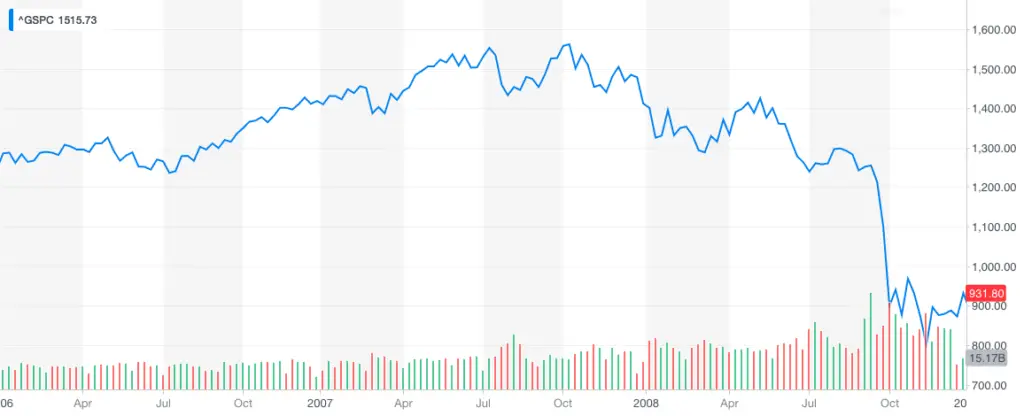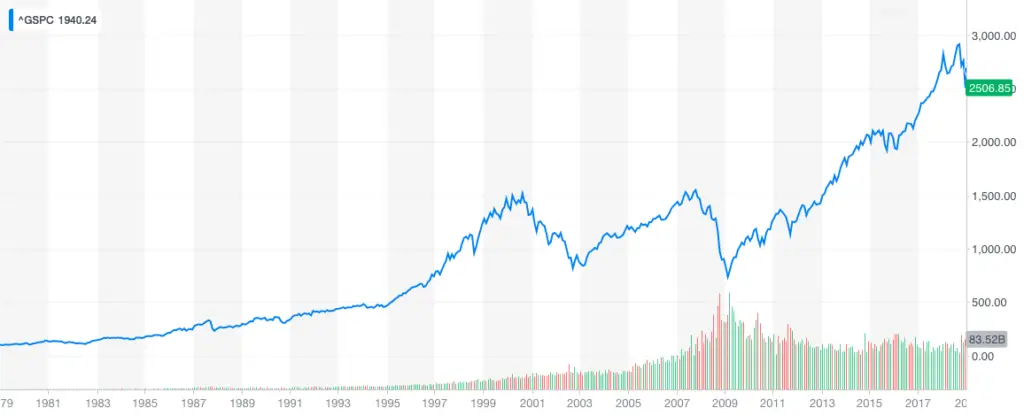Long term investing is easy. However, there is a lot of distracting, short term investment advice floating around these days. One of the most popular cliches is to, “buy low, sell high.”
Sounds like a winning proposition, but there is a problem with that strategy. No one knows when the market (or a stock) is “low” and when the market (or a stock) is “high.” Better advice is to “buy now, sell much later.” In other words, focus on long term investing and ignore the day to day. This way, you will guarantee you are buying low (now) and selling high (in the much distant future).
Trying to time the market (buying low now and selling high shortly afterwards) is gambling. Buying the market now and holding it for a long time period is investing. I don’t know about you, but I’m here to invest, not to gamble.
Still on the fence? Let’s look at some examples of when people knew exactly where the market was going to go.
Proof You Can’t Time the Market
To help set the stage, here is a graph of the S&P 500 that spans 3 years, 2006-2008. As we all (hopefully) know, 2008 was a rough year for the stock market. The graph clearly shows the downturn that starts in early 2008. Then, the bottom really drops out in late September / early October of 2008 when the S&P falls to 900 (down 40%+ from its peak in 2007 of over 1,500).

So, what’s the point? Why are we traveling back in time 10+ years?
Let’s look at what some of the experts were saying in September and October of 2007 – when the market was at its then all time high and about to take a drastic downturn. While it would be nice to think everyone was smart enough to pull their money out at the exact right time, unfortunately, that was not the case.
The End is Far:
- An Aging Bull Can Still Be a Raging Bull – New York Times, 10/15/07: This article summarized the lengthy bull market to that point (October 2007) and why it still had some run way. It quotes James W Paulsen, chief investment strategist at Wells Capital Management in Minneapolis, “I think this market still has a ways to go.” Well, it did trickle along for a couple months, until taking a huge plunge less than a year later.
- Interest Rates Slashed to Help Economy – CNN, 09/18/07: While this CNN article acknowledges the concerns in the economy, it is highlighting that moves by the Fed should help the economy (unfortunately, as we know now, it was not enough at the time and “the economy” plummeted).
The End is Near:
- Lack of Stock Market Breadth Warns of Danger Ahead – Seeking Alpha, 10/12/07: This article infers that the lack of breadth (and low market volume) signals potential trouble ahead for the stock market (aka, a recession). One quote from the article directly warns of a potential reversal in the market, “Therefore, the current situation could possibly be an early indication of a possible trend reversal.” Great call! Right?
- Cramer’s Four Horsemen of Tech: Revisited – CNBC, 09/24/07: Even Cramer knew the stock market would decline, “Get ready because the market could be due for a big decline, Cramer said Monday on Mad Money.”
Here’s the point. I’m not saying anything about the New York Times, CNN, Seeking Alpha, CNBC or the authors of any of the articles. All are fine media outlets (and I’m sure all authors had thorough research to back up their claims). I’m just saying that none of them had any idea where the market was going to go. Some just happened to be right (lucky) and the others wrong.
If you google news articles from that time period (early/mid 2007), you’ll likely find hundreds of other examples of some folks predicting the market to rise, and others to fall into a recession. More evidence to not look at your investments in the short term unless needed, let alone trade them.
Even today, with the S&P 500 returning it’s first negative year since 2008, no one knows what is going to happen:
The Market will Surely Go Up:
- Top 10 Stock Market Predictions for 2019 – Investor Place: One of the 10 predictions is that, “At some point in 2019, I look for the S&P 500 to be up at least 25% from the 2018 close.” They clarify that the market may not close 2019 +25%, but that at some point it will be +25%. Sounds like a fun rollercoaster to try to time.
The Market will Surely Go Down:
- 2018 Recap And 2019 Stock Market Predictions – Seeking Alpha: On the other hand, maybe the market won’t rise 25%, but instead drop 20%, “Far more likely is the possibility that we will see corrections across the market of 20% or higher as the bull market reaches the peak of its run and begins to tumble down.”
With the near future unclear, it only makes sense to ignore your investments in the short term and focus on long term investing.
The Bottom Line: Focus on Long Term Investing
So, no one knows when (or if) the market will go up and when (or if) the market will go down. Plus, you’ve got Market Watch telling you to “buy the dip,” which to me sounds a lot like “buy low, sell high.” What is an investor to do?
How about, “buy now, sell much later.” Ignore the day the day fluctuations of your portfolio, and focus on long term investing.
Taking a look at the past 40 years, the only thing that appears certain is that over the long run, the market tends to go up. $100 invested in the S&P 500 40 years ago would be worth roughly $2,500 today (not adjusted for inflation).

There is no better time to start than now. If you own the right investment vehicles and are properly diversified, you can weather any short term storm and come out the other end a little richer.
Don’t just take it from me though, check out what some real experts have to say about buying and holding for the long run.
Expert Long Term Investing Advice
John Bogle, Founder of Vanguard
John Bogle, an investing legend and pioneer, offers some great advice that is recapped in this New York Times article. One of his five pieces of advice is to, “Stay the Course.” He goes on to explain that, “Wise investors won’t try to outsmart the market… They’ll buy index funds for the long term, and they’ll diversify.”
Warren Buffett, CEO of Berkshire Hathaway
Warren Buffet, one of the most successful investors of all time, constantly advises investors to be long term investors. This Motley Fool article recaps some advice from a recent Berkshire Hathaway Annual Meeting. In short, Buffet is for long term investing, “Many investors still focus too little attention on the resiliency of the U.S. economy and too much attention on the day-to-day profit and loss of their investments.”
Mark Cuban, Entrepreneur and Investor
Even Mark Cuban, who is seen as more eccentric than other boring, long term investors advises in this Market Watch Article, “The key is living within your means. Saving money and putting some into a low-cost mutual fund — like an SPX fund — and living as inexpensively as you possibly can, will pay off dividends.”
Take it from the pros. Find some low cost index funds or ETFs and focus on long term investing.
One other quick note: I know, this article is titled, “Don’t Look at Your Investments!” You shouldn’t, mostly. The only times you should are:
- When you are adding more money to your accounts.
- When you rebalance your portfolio about once a year.
- If you are at retirement age and are gradually withdrawing money.
Just Start Investing is a personal finance website that makes investing easy. Learn the simple strategies to start investing today, as well as ways to optimize your credit cards, banking, and budget. Just Start Investing has been featured on Business Insider, Forbes, and US News & World Report, among other major publications for its easy-to-follow writing.


I wonder what Japanese Investors would think about your advise. The would still be negative almost 30 years after investing for the ‚long term‘. Stocks are mostly overvalued and that is bad time to invest. I would rather forgo a year or two of potential gains then investing right before the crash loosing +6 years of value (inflation adjusted) just to break even. The banking sector squeezed out what they can squeeze out of the common man in the US. Debt at corporate, government, and personal level is unsustainable and banks are overextended as usual. I wouldn’t call this a resident market to invest in. I Guess we will all know in a few months, but I for sure am staying away from financial markets until valuations normalise and reflect the true economy (which in my view is in recession already).
Interesting take. The Japanese example is a unique one that gets brought up often. My two responses would be: 1.) I am investing primarily in US markets, which have always recovered from massive losses (although sometimes it takes longer than you’d like) and 2.) I also invest in a variety of index funds, both in the US and Internationally, which partially protects against one specific market taking a huge dip. Although its a risk, I view it as (hopefully) a small one.
On your point about the market being overvalued, you could be right. You could also be wrong and miss out on another 5 years of consistent gains. Who knows. I have a long horizon under which I will be investing (not near retirement age) so I don’t mind riding out the peaks and valleys as I’ll likely be contributing funds consistently along the way. This is a basic measure, but the PE ratio of the S&P is ~20. Which is within the avg. 15-20 range it has been in since the early 90s, and much less than the 30+ it was during the internet bubble of the early 2000’s.
Bottom line: I have no idea what will happen in the short term, but in the long term the US market has always gone up (that’s the only data I have). So I’ll be contributing funds to the market all along the way.
The market will drop again. There is no way around it. It will also go up again. The comparison to Japan is off for a number of reasons. The US has a more diverse economy than Japan, vastly greater amounts of key natural resources (namely oil and gas), and a different culture and population. Japan is the extreme end of the aging population, and the US, regardless of politics here, is at least comparatively much more open to immigration. All of those reasons make us in a better position than Japan. I would argue that our large oil supplies are the big advantage these days.
That all being said, to quote the late great Yogi Berra, “predicting is hard, especially about the future.” I am sure I scrambled the quite a bit, but that’s pretty close to the mark. There is no way to be sure what is going to happen, so the best you can do is to be prepared.
Great quote. I think you’re spot on. There is no way of knowing what will happen, especially in the short term, but you can be prepared by having the right mix of diversified investments to set yourself up for long term growth.